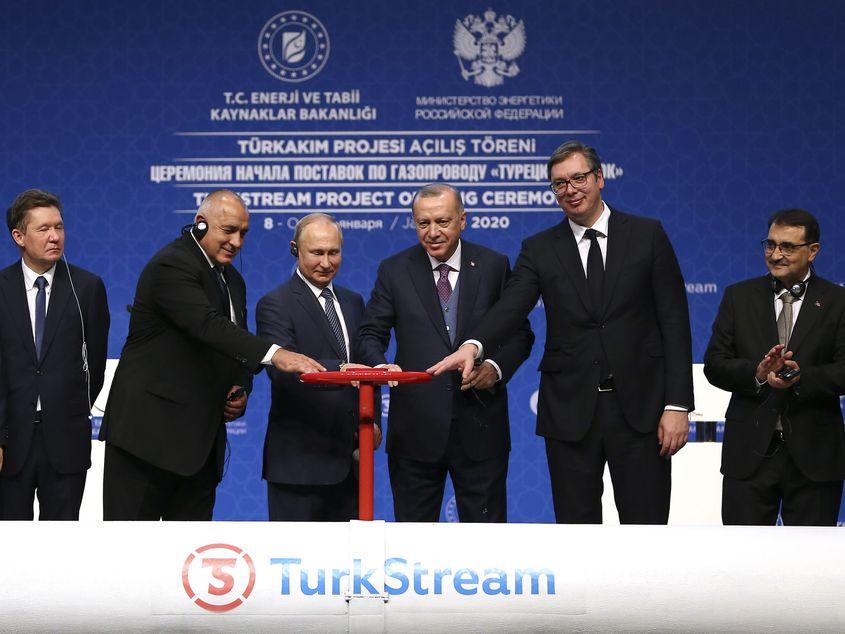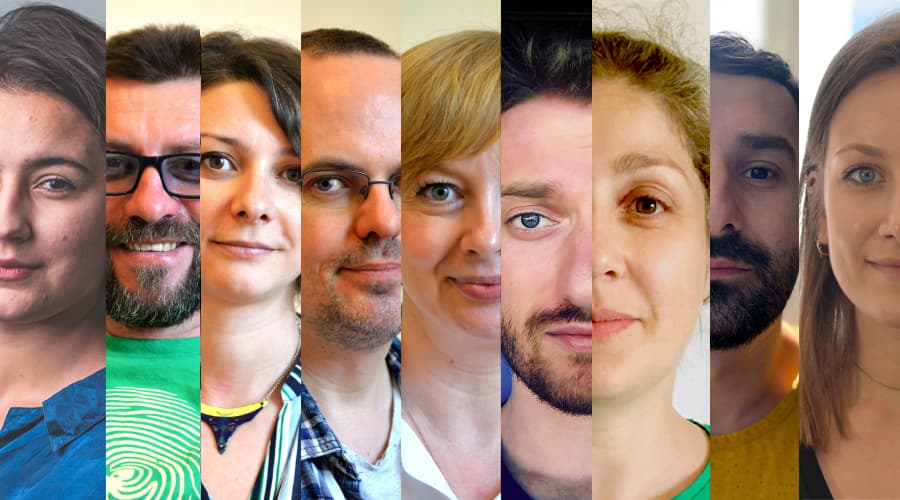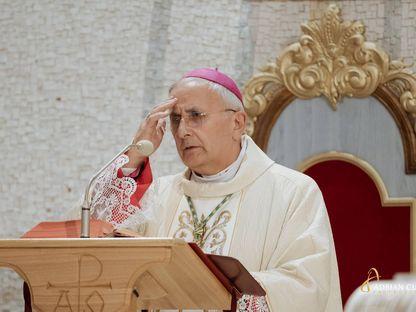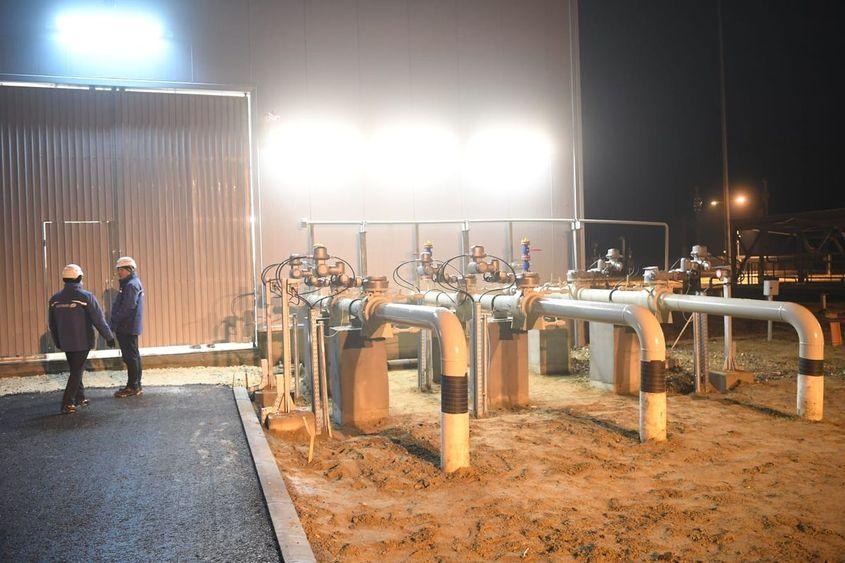ISTANBUL, TURKEY - JANUARY 8: President of Turkey Recep Tayyip Erdogan (3rd R) and his Russian counterpart Vladimir Putin (3rd L) along with Serbian President Aleksandar Vucic (2nd R) and Bulgarian Prime Minister Boyko Borisov (2nd L) open the valve during the opening ceremony of TurkStream natural gas pipeline project, at Halic Congress Center in Istanbul, Turkey on January 08, 2020. Photo: Anadolu Agency

ISTANBUL, TURKEY - JANUARY 8: President of Turkey Recep Tayyip Erdogan (3rd R) and his Russian counterpart Vladimir Putin (3rd L) along with Serbian President Aleksandar Vucic (2nd R) and Bulgarian Prime Minister Boyko Borisov (2nd L) open the valve during the opening ceremony of TurkStream natural gas pipeline project, at Halic Congress Center in Istanbul, Turkey on January 08, 2020. Photo: Anadolu Agency
09/05/2022
Has Putin Actually Helped Bulgaria by Halting the Russian Gas Supply?
Two weeks ago, the Russian Gazprom announced that it would no longer deliver gas to Poland and Bulgaria. The reason - the sanctions towards the Russian Federation. But did the Bulgarian people actually need this to happen?
The gas offensive helped Bulgarians see the real face of the President Radev
The Bulgarian president Rumen Radev was elected twice for office. Initially, he was the candidate of the Socialist party, a party with strong ties with Russia. The second time he won the elections, in November 2021, he ran as an „independent” candidate, but had the support of several parties - among them, the „We Continue the Change” party that won the parliamentary elections.
The leaders of „We Continue the Change” were ministers in the caretaker government formed by Rumen Radev in April 2021, after the general elections, when the Bulgarian parliamentary groups failed to reach a compromise.
With the beginning of the war, it seemed that a conflict was brewing between the president and the government. The new Bulgarian government of Prime Minister Kiril Petkov was pro-European and in support of Ukraine. The prime minister even announced that if it were his decision alone, he would definitely send military assistance to Ukraine – in spite of the opposition of the Socialist party, which was also part of the government.
At the same time, president Radev argued that sending military help in Ukraine could be dangerous for Bulgaria.
With the gas offensive, Putin helped people see the real face of President Radev: he is now in the same boat as his former caretaker prime minister, Stefan Yanev: a NATO general who sides with the enemy.
In all of his speeches, the president talks about how Bulgaria and Russia are „brothers” and about how Bulgaria should maintain its "independence" in the conflict. He doesn't even use the word „war”; he uses „operation” instead – exactly like Vladimir Putin.
By suggesting that both Ukraine and Russia are responsible for the war, Rumen Radev acts more like a pro-Russian than a pro-NATO president, which a surprising thing for a NATO country.
Mulți ne citesc, puțini ne susțin. Fără ajutorul tău, nu putem continua să scriem astfel de articole. Cu doar 5 euro pe lună ne poți ajuta mai mult decât crezi și poți face diferența chiar acum!
The conflict between him and the government diminished public trust in both the government and the presidency.
It brought Bulgaria closer to Poland
Putin did Bulgaria another favour - he elevated it alongside Poland. Decades ago, both Bulgaria and Poland were communist countries with a close relationship with the Soviet Union, and this convinced Putin that he could control these countries, even though both are members of the European Union.
The gas supply halt was meant to prove that Poland and Bulgaria are not strong and independent enough to support Ukraine. But in fact it proved the opposite, by putting together Bulgaria, the poorest country in the EU, alongside Poland, the richest ex-socialist country in the EU. The two countries are closer than ever only because of Russia's decision to cut off gas supplies.
This means that Bulgaria's geopolitical role is far from unimportant and that Russia would need Bulgaria as an ally, but by shutting off the gas it will completely destroy the link between the two countries instead of strengthening it.
Predator in Robes: The Diocese of Iași and the Vatican Buried a Sexual Assault Committed by a Catholic Priest Against a Minor in Bacău, Failing to Alert Prosecutors
A Roman Catholic priest abused a 13-year-old girl in the parish where he served in Bacău County: the bishop of Iași knew about it, sent the case to the Vatican, and applied canonical sanctions, but did not notify the authorities, who only intervened later and sentenced him to prison.
The decision to send military assistance to Ukraine is finally on the Parliament's agenda
Nearly half of Bulgarians describe themselves as "Russophiles" (pro-Russian). And even the most devout of them may eventually begin to doubt the truth of the old saying about how no sword cuts off a bowed head. But it will take a lot more time and effort for people to truly understand the threat of an unloved big brother with a sword in his hand.
Un newsletter pentru cititori curioși și inteligenți.
Sunt curios
Putinophilia is unlikely to melt away quickly, as there has always been a huge overlap between Russophilia and the Kremlin in Bulgaria. But at least now there is a chance to end the two months of agony over the decision to send military assistance to Ukraine, a context which helped Putinism gain momentum. The political discussion about whether or not Bulgaria should send military assistance to Ukraine began with the start of the war and continues to be politically instrumentalized by both democratic and nationalist parties. And while the politicians argue, many other EU countries are not only sending weapons, but doing everything they can to help Ukraine win this bloody war.
The issue of sending military aid to Ukraine was delayed so much, that it was on the verge of becoming a joke. Now, it is almost certain that it will be voted in the Parliament by the end of the week with a significant majority. Only the BSP (the socialist party) and Vazrazhdane (the nationalist party) can vote against it. GERB (the former rulers, now the main opposition) can also politically instrumentalize this decision if they decide to apologize for all the years they neglected the gas issue and by trying to buy public forgiveness with a pro-military aid vote for Ukraine in the parliament.
Diversification is no longer just important, it is a necessity
It's common knowledge that former Prime Minister Boyko Borisov was not only the most corrupt minister in the EU, but also a member of the security detail of former communist leader Todor Zhivkov, who was Prime Minister of Bulgaria between 1945 and 1989. Borisov signed a contract to build the so-called "TurkStream", allowing it to pass through Bulgarian territory without actually supplying gas to Bulgaria. He also pretended to diversify, but in the meantime signed strong contracts with Gazprom, allowing it to supply up to 90% of the gas needed in Bulgaria.
So the whole diversification process was sabotaged for years.
The other main pipeline - the Greek interconnector - was supposed to be ready by the end of 2020, but the companies that won the public bids to build it failed to complete it on time and asked for an extension of the deadline. In March, Prime Minister Kiril Petkov announced that it would become operational on July 1st.
The interconnector is essential to Europe's plan to reduce its dependence on Russian natural gas. The pipeline would connect to the Trans Adriatic Pipeline (TAP), the end point of the 3,500-kilometre Southern Gas Corridor, which links the Caspian Sea to Italy via Georgia, Turkey, Greece, Albania and the Adriatic Sea.
Prime Minister Kiril Petkov also promised to invest in various other types of green energy, such as solar panels and wind power. Meanwhile, Assen Vasilev - the Finance Minister, gave an interview to Sky News, in which he claimed that Bulgaria will never pay in Russian rubles for gas, but that Bulgarians don't have to worry about winter.
While Bulgaria receives 90% of the gas it needs from Gazprom, this only amounts to 3 billion cubic metres of gas, which can easily be delivered from Azerbaijan, Finance Minister Assen Vasilev added.
And although Bulgaria's 550 million cubic metres of gas storage is currently only 17.6% full, this would be enough to supply businesses and households until the end of the year, when the interconnector is expected to be commissioned, which would mean that Bulgaria could receive Azerbaijani gas at a good price. The Bulgarian government does not expect supply problems and there is no need to reduce gas consumption in the country, Prime Minister Kiril Petkov said.
By halting gas supplies, Russia helped Bulgaria to take the necessary steps towards real diversification and to understand that it is not possible to pretend to be neutral during such a war. By the end of the week, Parliament will have to vote on whether to send weapons to Ukraine, and Russia's decision to stop gas supplies will have certainly played a role in this decision.
A single step by Russia, the halting of the gas supply, has led to so many political moves that will surely bring changes to Bulgaria in the coming decades. There is hope that all this will finally end the "transition period" from communism to democracy and make Bulgaria a truly independent EU country - especially from Russia.

Avem nevoie de ajutorul tău!
Mulți ne citesc, puțini ne susțin. Asta e realitatea. Dar jurnalismul independent și de serviciu public nu se face cu aer, nici cu încurajări, și mai ales nici cu bani de la partide, politicieni sau industriile care creează dependență. Se face, în primul rând, cu bani de la cititori, adică de cei care sunt informați corect, cu mari eforturi, de puținii jurnaliști corecți care au mai rămas în România.
De aceea, este vital pentru noi să fim susținuți de cititorii noștri.
Dacă ne susții cu o sumă mică pe lună sau prin redirecționarea a 3.5% din impozitul tău pe venit, noi vom putea să-ți oferim în continuare jurnalism independent, onest, care merge în profunzime, să ne continuăm lupta contra corupției, plagiatelor, dezinformării, poluării, să facem reportaje imersive despre România reală și să scriem despre oamenii care o transformă în bine. Să dăm zgomotul la o parte și să-ți arătăm ce merită cu adevărat știut din ce se întâmplă în jur.
Ne poți ajuta chiar acum. Orice sumă contează, dar faptul că devii și rămâi abonat PressOne face toată diferența. Poți folosi direct caseta de mai jos sau accesa pagina Susține pentru alte modalități în care ne poți sprijini.
Vrei să ne ajuți? Orice sumă contează.
Share this



